“We want the best for this region. We want peace and security here. Personalities will change. That’s for sure. But, I think people need to understand that our interests are more permanent than that and more lasting!”
H.E. Christopher Hill, American ambassador to Serbia / Interview by Robert Čoban
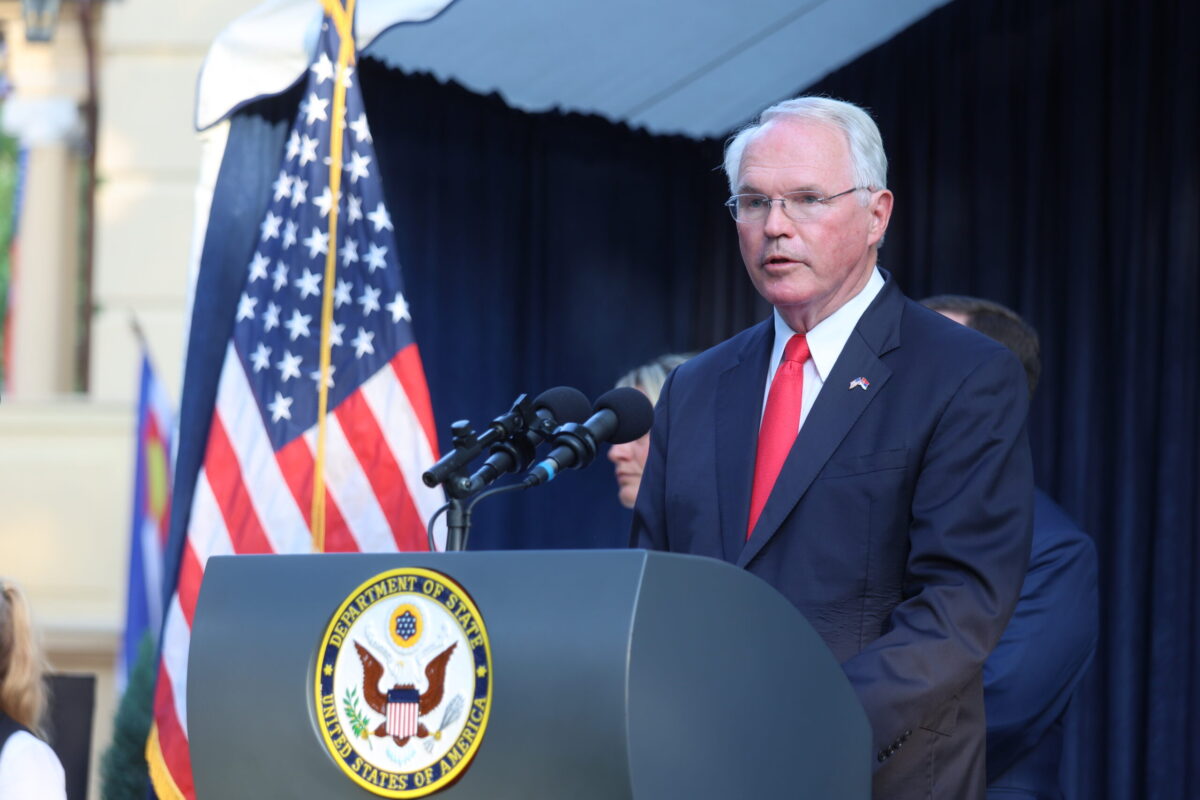
While I was waiting for Ambassador Hill on the ground floor of his residence in Belgrade’s Dedinje neighborhood, I drank coffee kindly offered to me by his wife Julie and looked at photos from his rich diplomatic career. One in particular caught my attention. On it is the date November 20, 1995. Better connoisseurs of the Balkan situation know that it was the day before the Dayton Agreement was reached, which was officially signed in Paris on December 14, 1995, and which ended the war in Bosnia and Herzegovina. In the photo, we see Ambassador Warren Christopher, Richard Holbrook, Alija Izetbegović, Slobodan Milošević, and, then a young diplomat – Christopher Hill.
Ambassador Hill descends the stairs and recalls those days in Dayton and how important it was to the French that the agreement be signed in Paris and be remembered as the Paris Peace Treaty. However, history wanted us all to remember it as the Dayton Agreement.
Your Excellency, last September, we opened our Day of America in Belgrade with a video of the famous Martin Luther King speech “I Have a Dream”. It was the 60th anniversary of this event. In your opinion, what is the American dream today, 61 years after Martin Luther King’s speech?
In a real sense, it’s still Martin Luther King’s dream. It’s an extremely important thought, and it is basically the concept that the arc of history is as long as the intervening years would suggest, but it does indeed bend toward justice.
And, it’s kind of an optimistic statement, but it’s also asking not only for optimism but for hard work and for something to happen. So, I think it’s very much, our country is in that mode. We have our problems, you have your problems. Everyone has their problems right now. But I think we can solve them better if we are together.
Do you think that this agreement with mister Assange is part of this? It’s making a better picture of America as still, the “land of the free and home of the brave”.
I’ll let you answer your question. I comment like this: He was involved in some very serious matters that affected not only American national security but the security of individuals whose names came out. So I will leave that up to you to answer.
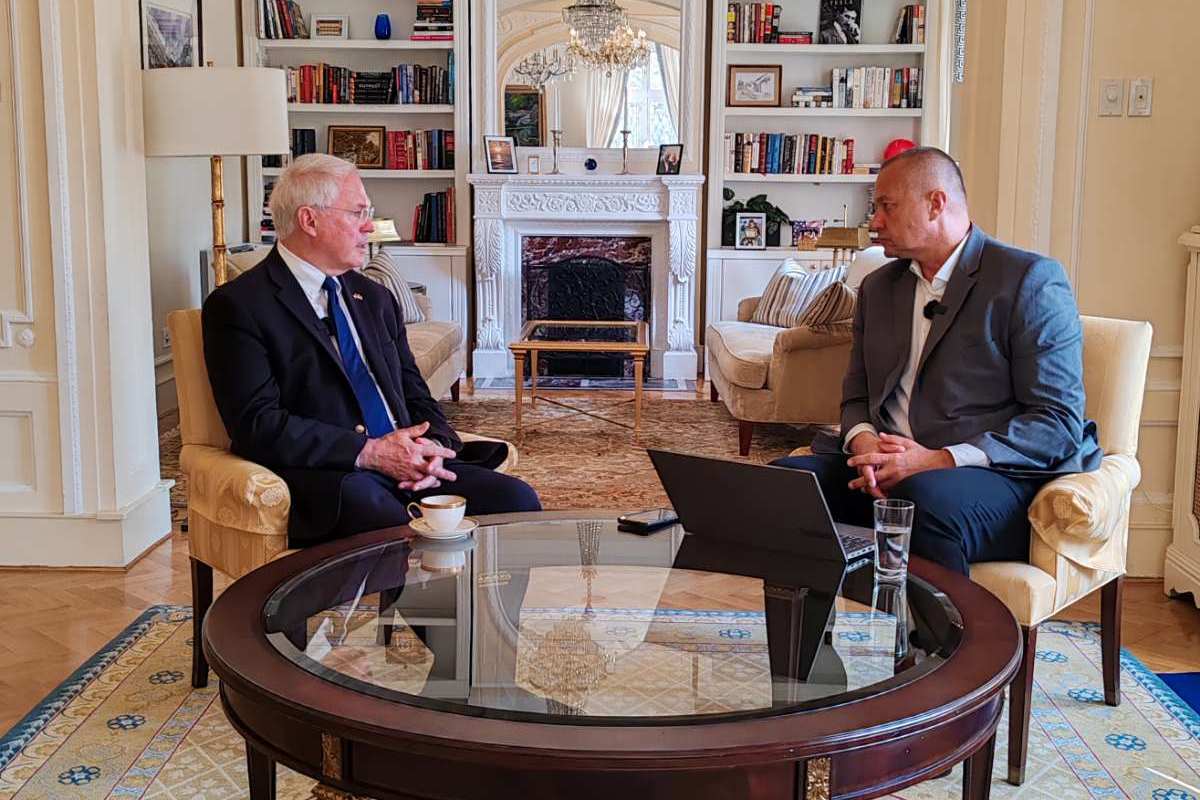
When I was a student in the ’80s, I subscribed to the magazine “Pregled” published by the US Embassy in Belgrade. Do you think American “soft power” is still present and innovative enough in this part of the world today?
Well, I think soft power is really about doing a lot of listening and understanding what is going on and trying to be helpful and, not to be, you know, angry or resentful, but rather to lend a helping hand. And I think we try to do that in this region. I can not say we do it through a magazine called “Pregled”, but, I think we do it through other means. And, I think we have, in particular, in Serbia, a very active embassy that reaches out to all elements of Serbian society in the hopes that we can find greater understanding. And that is really what is our power. Cultural exchange, all kinds of things. And, I think it is especially important in Serbia because you have this very dynamic cohort of younger people. These are people who, in so many ways, share our culture. And the whole tech culture in Serbia is something that I think our two countries can build on. There are other things. There is an athletic culture too. Serbs are very present in the US basketball scene, for example. So I think there are a lot of things that bring us together. And so, I think it goes well beyond the capacity of an embassy to hand out a magazine.
After 3 years in Belgrade as US ambassador to Serbia, what can you say, how our country has changed in your eyes since the nineties when you first came here and since 1921 when you arrived as US ambassador?
I think this is a very different country from the nineties. Very different country. I think there is, frankly, a lot more of an economy than ever before. The process of foreign investment has had a profound impact on the way people think here about the world. And the understanding that Serbia has interest not just with its neighboring countries, but also interest, in broader Europe. In the nineties, Serbia had no aspirations, really, of joining the European Union. And now those aspirations and the possibilities are very real.
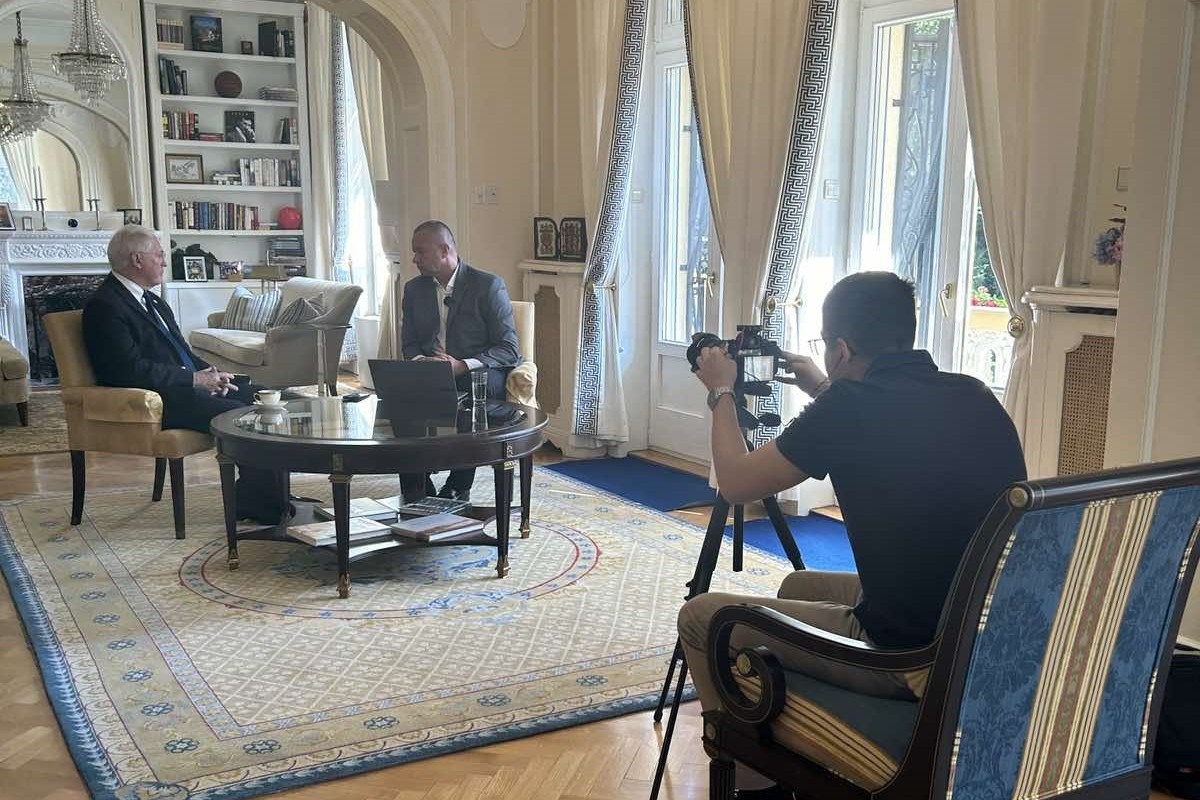
When you first came, was it in the early nineties?
I was here in the nineties because I was dealing a lot with the Dayton Peace Agreement. But I was here earlier. I was here, actually as a very young diplomat in the late seventies. So you can compare really totally different decades. I mean, in the late seventies, I mean, 1980, I was here in May 1980 when, when comrade Tito died. So, yes, I have seen different, different aspects of Serbia. In fact, to go even further back, my dad, my father was a diplomat here, and I was a 6-year-old kid.
During my first visit to the United States in January 1994, I was on the International Visitors Program. I saw President Clinton’s first State of the Union address. I remember how important this was to me as a young journalist from a troubled Southeastern European country. In this election year in the US now, what is your opinion on how the results of this election can influence future Serbian-American relations? In our media, there is always an expectation that everything will change if Trump becomes president – or not. It was so in 2016 as well in 2020 or today in 2024…
Well, you know, just as I don’t like to interfere in domestic, Serbian relations – I really don’t like to interfere in domestic US relations. We will elect, we will have an election in November that much I’m sure of.
Did you watch the Presidential debate yesterday?
It was too late for me, but I have seen some replay in the media. Anyway, I think people need to understand that we have some lasting interests, and those interests will bridge any two administrations or any two halves of one administration. So we have some lasting interest. And so I would not encourage your viewers to think in terms of huge changes in our approach. We want the best for this region. We want peace and security here. We want these countries to realize their aspirations. Doesn’t matter who is who. It doesn’t really matter. So, you know, personalities will change. That’s for sure. But, I think people need to understand that our interests are more permanent than that and more lasting.
Your views are sometimes different, from the views of some European officials and politicians regarding the potential Serbian recognition of the independence of Kosovo, as a final step on our path to the EU. What is your opinion regarding this, for many people in Serbia, a crucial topic?
First of all, what the Europeans are doing is the right thing. And what they are doing is trying to get Kosovo and Serbia to have a normalized relationship. And that means, first of all, reducing tensions, but it means, especially, the idea of sort of getting along with being able to work together on issues. So normalization is what the European Union is seeking. Looking beyond, I mean, I think it is important to understand that if you can have, as the Europeans call it “a normalization” that is fundamental, that is broad-based, and and legally binding, normalization. You can build a very strong platform to build other things on it.
So I think the first thing is normalization, and that’s what the Europeans are trying to do, and that’s what we are trying to do to help the Europeans because that is absolutely key. If there is no normalization, that means instability, that means problems. And while the Europeans want to see Serbia among them, that is within their structures, They want to see Serbia resolve or at least address problems before Serbia comes in. So, I think they are very much focused on normalization, and we are too.
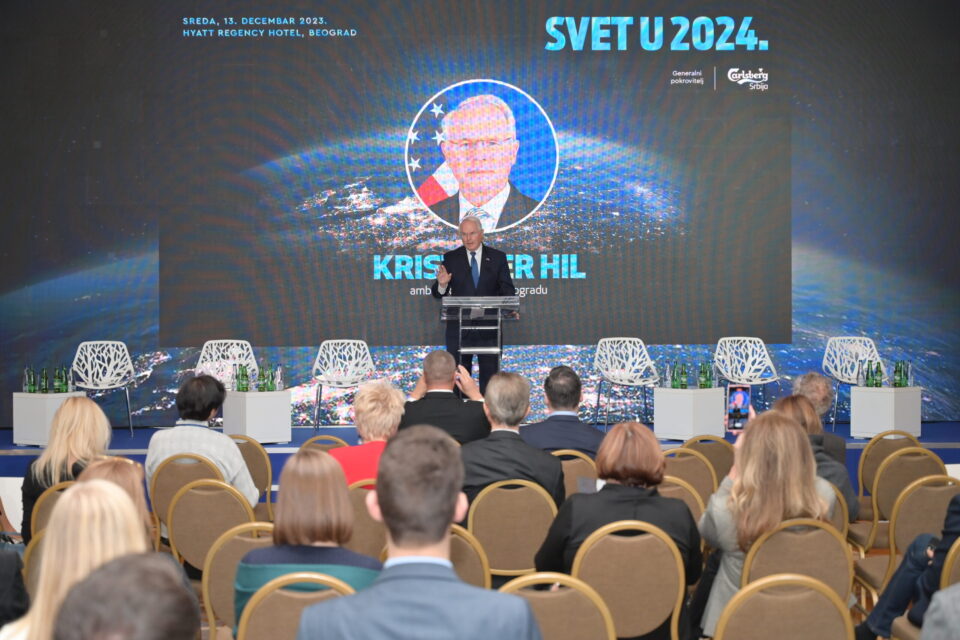
Speaking about normalization, this is the news from yesterday. Would you like to comment on the banning of this “Mirdita – Dobar dan” festival in Belgrade?
You know, I’ve seen that news, of course. This is a European Union-sponsored art festival. I’m kind of surprised about this decision. I wasn’t expecting this. There are always security concerns. I understand that. But I don’t understand this decision. This festival was a great look for Serbia, where it had been held for 10 years. It deals with how to cooperate with others throughout the region. So for me, I don’t understand why such an opportunity should be missed.
Lithium exploration and Rio Tinto are also hot topics for people in Serbia, especially today after the Serbian government announced that this project is not closed as they stated in January 2022. What is the official position of the US regarding this topic?
First of all, I don’t think we have an official position on this. This is a matter for the Serbian people, to determine what is best in Serbia’s interest. I think Serbia has tried to have a debate about this. This has been kind of politicized, not unusual in today’s world where many issues become politicized. But I think the most important issue is for everybody to determine whether it’s helpful for Serbia’s future. And, can lithium be part of a modern economy? Can it be part of a value chain of modern technologies? And, otherwise, it’s just a mining project. I think there’s a big effort to make sure that people understand that this is part of a modern economy, and it’s for Serbs to decide and stop foreign diplomats from making decisions for them.
Do you think we need real discussion, real conversation? Because I don’t think in the past couple of years, we had this kind of conversation in one room. We see only accusations from both sides, but not conversation in one room.
I mean, we live in an age where often, you know, emotion becomes a big part of every conversation. And I think, really, there needs to be less emotion and more attention to whether this project is good for Serbia. And I think there seems to be, at least a decision as you allude to, to the fact that this is something that should be part of Serbia’s future. I know that Serbian institutions have looked very carefully at the environmental issues. If people continue to have more concerns, they ought to be asking those institutions. Again, this is a matter for Serbia to get together and decide what is in the best interest of their country and, going forward from there. Serbia is going to be in the electric vehicle business. There’s going to be a new “panda” coming out of Kragujevac which will be great. It’s kinda nice to see that, you know, there is this modern economy, this postmodern economy if you like, and that, Serbia can be a part of that. And I think the argument of those, including in the government, who believe that lithium is good for Serbia, the argument is that lithium is very much tied to this modern economy. So, again, Serbs, they need to decide this. They need to listen carefully, make their own decisions, and have their public debates.
We are the “Diplomacy of Commerce” magazine, so we have “commerce” as a part of our title. What’s your opinion about the potential improvement of business relations between Serbia and the US?
Well, I think we are getting there. I think a lot of good things have happened. First of all, we have a very successful and influential American chamber, here in Belgrade. And I think they have done a lot to be very reassuring to other American companies that might be looking at the Serbian market, might not have known a lot about the Serbian market. So the fact that you see some American companies, some very serious American companies coming to Serbia, I think is a very good sign. I think, continuing to focus on that because ultimately, Serbia, given its size, will always need other markets, not just markets in Serbia, but other markets. And so I think it’s kind of an encouraging sight when you drive along some of Serbia’s new infrastructure. And by the way, infrastructure is a big, big part of this issue. To see these companies, building factories and building, data centers and issues like that. I think Serbia, especially its young people, needs to be assured that this economy is modernizing and is going to stay up to other economies. I know there’s a lot of concern about the demographics in Serbia, the demographics of many Eastern European countries. So people need to be assured that this is a good place to raise a family. And I think more and more people understand that. I think this road network helps. The fact that you can live in Kragujevac and work in Belgrade is a good sign.
Like myself – Commuting from Novi Sad to Belgrade daily, by train.
Novi Sad is such a center. I think Belgrade is the suburb of Novi Sad (laugh). But seriously, I think the development of some of these other cities is important.
We saw, according to the last census in 2022, that only Novi Sad, Belgrade, and Novi Pazar face an increase in population between the two censuses. The rest of the cities are declining.
It’s really about infrastructure and making sure that, you know, if you live down on the Morava corridor, you can, you can get to Belgrade in a reasonable amount of time. You can go visit your parents, or grandparents down there and have Sunday lunch with them and still get back in time to Sunday night to prepare your kids for school. These are very positive trends in Serbia. And I think it’s a trend that foreign businesses will look at and see a certain commitment of the population to a country that is developing in a modern way.
Would you like to add some message at the end of this interview, before Independence Day to our readers and people in Serbia?
The other day, I was reading the American Declaration of Independence. You know, it was July 4, 1776. And it/s interesting that we still talk about the concepts. It’s, about the rights of the individual, what rights we all derive from the fact that we exist, and how governments should be instituted to protect those rights. And when you read through this kind of material, you realize that our two countries share a lot of values. And sharing values, I think, is the essence of partnership and friendship. But frankly, I would like to see more between Serbia and the United States. And so I think we all ought to, consider the fact that even though we are separated by a big ocean, the Atlantic Ocean, and the Mediterranean Sea, in some aspects we are also much closer than the geography might suggest.
Thank you for this interview, mister Ambassador, and happy Independence Day.
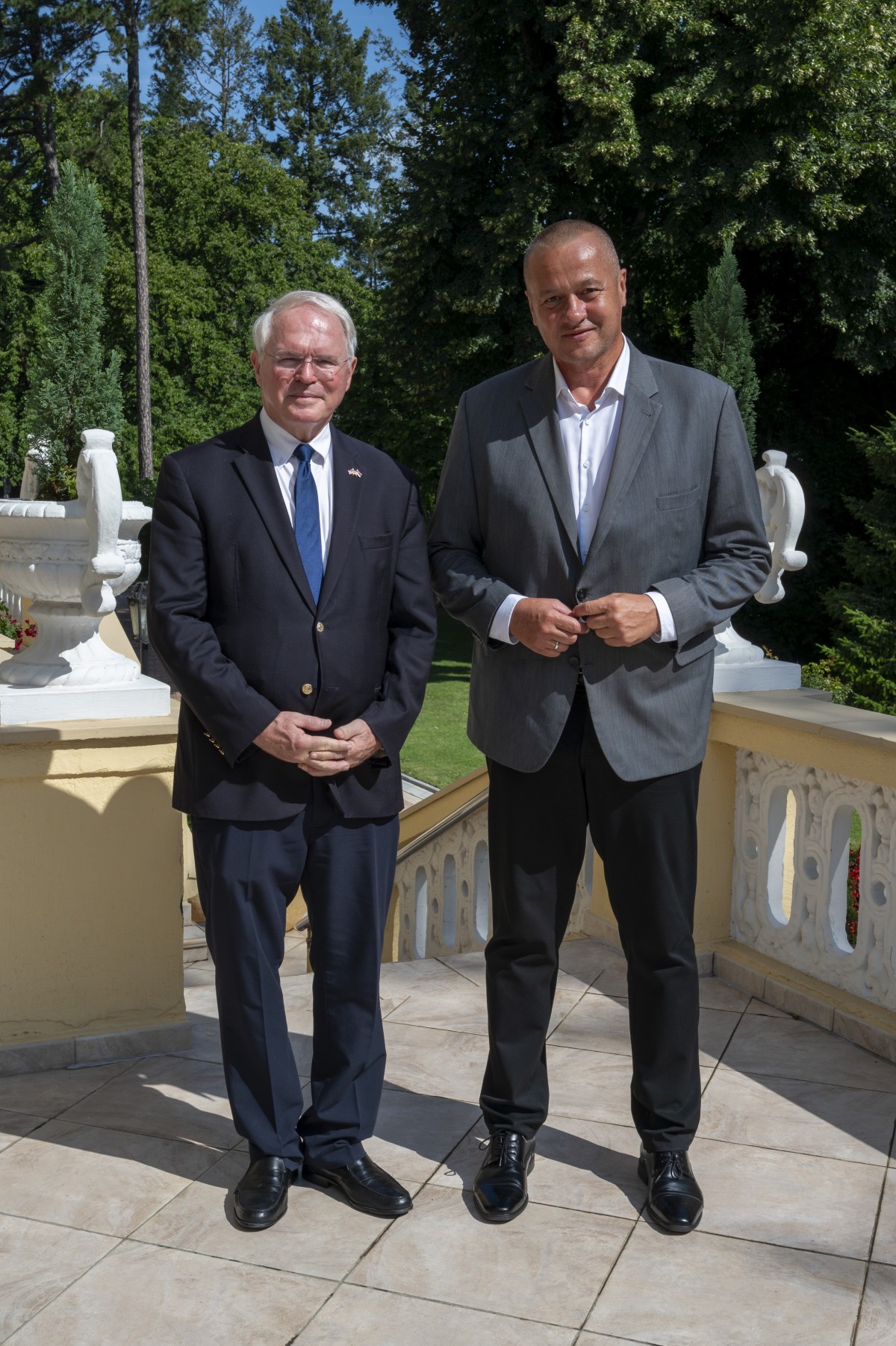
You can watch this interview in our Youtube video